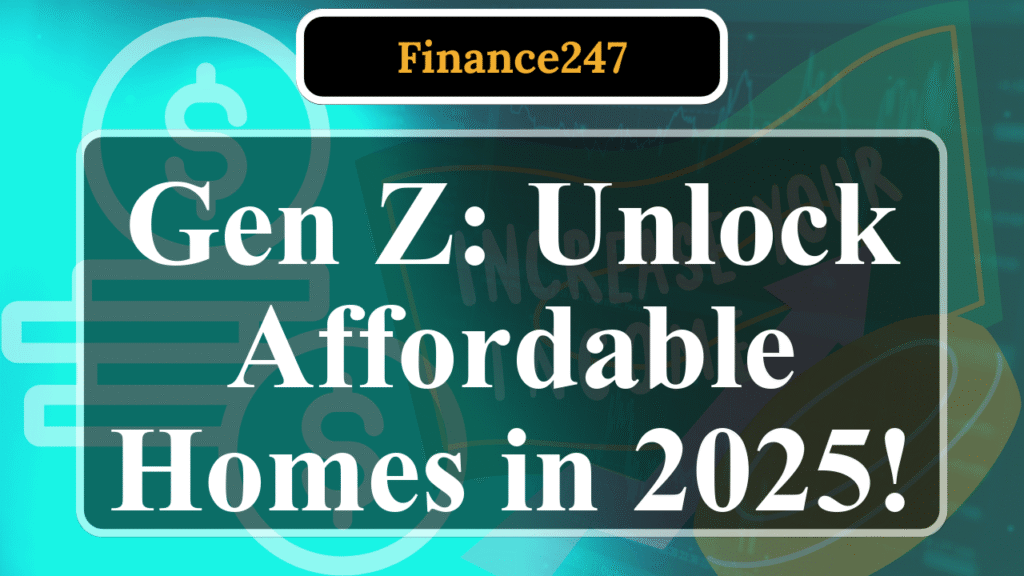Despite soaring home prices and high interest rates, Gen Z is breaking into the housing market with creative strategies. This article explores practical ways for young buyers to find affordable homes, including targeting low-cost markets, leveraging financial assistance, co-buying, and embracing fixer-uppers. Learn how to navigate the 2025 housing landscape with smart financial planning and resourcefulness.
Navigating the 2025 Housing Market as a Gen Z Buyer
The housing market in 2025 remains challenging for Gen Z, with median home prices at $407,500 and mortgage rates hovering around 6.8%. Yet, many young adults are finding ways to achieve homeownership. Here’s how Gen Z can secure affordable homes in this competitive environment.
Target Affordable Markets
Gen Z buyers are flocking to Midwest and South metros where median home prices are below $300,000. Cities like Des Moines, Iowa ($267,594), Omaha, Nebraska ($274,400), and Youngstown, Ohio ($136,040) lead the pack, with Gen Z accounting for 20-21% of mortgage applications in 2024. Pittsburgh, Cincinnati, and Indianapolis also offer homes under $225,000, making them ideal for young buyers. These markets provide lower costs and job opportunities, enhanced by remote work flexibility, allowing buyers to move to suburbs or smaller cities without sacrificing career prospects.
Leverage Financial Assistance Programs
First-time homebuyer programs are critical for Gen Z. Fannie Mae’s HomeReady and Freddie Mac’s Home Possible mortgages offer low down payments (as little as 3%) and flexible credit requirements. In 2024, 36% of Gen Z and millennial buyers expected family cash gifts for down payments, while 21% anticipated family loans. Parents or siblings with strong credit can co-sign mortgages, boosting approval chances for those with limited credit history. Check local housing authorities for state-specific grants or down payment assistance programs.
Consider Co-Buying
About one-third of Gen Z buyers are open to co-buying with friends, family, or partners, a strategy more popular than among millennials. In 2024, 45% of Gen Z mortgage applicants had co-applicants, often parents or siblings, to share costs and improve loan eligibility. Co-buying can make higher-priced markets accessible by pooling resources, though it requires clear legal agreements to avoid disputes.
Embrace Fixer-Uppers and Compromises
Over 57% of Gen Z buyers are willing to purchase fixer-uppers to secure lower prices, with 25% open to living in less desirable or less safe areas for affordability. Many are also opting for smaller homes or properties outside their ideal locations—92% of Gen Z homeowners in 2025 didn’t buy in their “ideal area.” These compromises stretch budgets further, especially in markets like St. Louis ($185,000) or Detroit ($165,000).
Boost Income and Savings
Financial discipline is key. In 2025, 30% of Gen Z homeowners reported taking second jobs to save for down payments. Living with family or friends while saving is another tactic, with 34% of prospective buyers considering this. Cutting expenses, like prioritizing rent over discretionary spending, helps build savings faster. Remote work opportunities also allow Gen Z to relocate to affordable areas without job constraints.
Shop Smart in a Shifting Market
Recent data suggests the market may soften in 2025, with home sellers outnumbering buyers and price growth slowing. This shift could give buyers more negotiating power. For example, some sellers are covering closing costs, as seen in cases like Rylee Arnold’s Salt Lake City purchase. Gen Z should work with real estate agents familiar with local markets to negotiate deals and explore seller concessions.
Enhance Financial Literacy
A 2022 survey found 76% of Gen Z lacked a clear understanding of credit scores, critical for securing favorable mortgage terms. Programs like Junior Achievement and online resources from Fannie Mae can improve financial knowledge. Understanding mortgage jargon, interest rates, and loan options empowers buyers to make informed decisions. Gen Z’s tech-savviness aids in researching homes online, but consulting professionals ensures clarity during complex processes like closing.
Prioritize Long-Term Investment
Gen Z views homeownership as a wealth-building tool, with 87% citing it as key to financial stability. The median net worth of homeowners ($396,200) far exceeds that of renters ($10,400). Buying early, even in less expensive markets, allows equity growth for future upgrades. Gen Z buyers like Dominic Azpeitia in Phoenix see homes as long-term investments, planning to rent them out later.
Disclaimer: This article is for informational purposes only and not financial advice. Consult a financial advisor or real estate professional before making homebuying decisions. Information is sourced from recent reports, including CoreLogic, Redfin, National Association of Realtors, and other real estate analyses.


